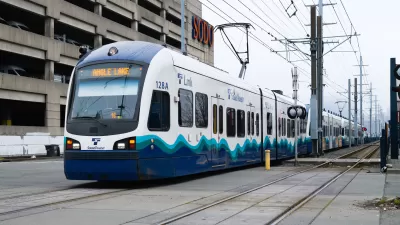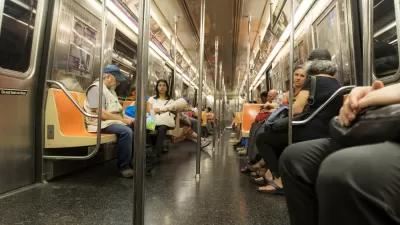A proposal under consideration by Washington State lawmakers would give public transit riders a seat at the table and a voice in decisions that directly affect them.

The Washington State legislature is considering a bill that would give public transit riders direct representation on state transit agency boards, according to a recent article from the Urbanist. The proposal would allow, but not require, around two-thirds of transit agencies in the state to appoint two designated rider representatives to their boards, one who “relies on public transit as their primary mode of mobility” and the other “who represents an organization that serves transit-dependent individuals,” writes Ryan Packer. The bill also would require public transit boards to hold their meetings in transit-accessible locations.
Public transit agency boards make decisions that impact the daily lives of thousands of transit riders. But “[m]any on these boards of authority have never experienced mass transit in a personal way, making decisions without understanding the ramifications to the ridership in their daily lives in the communities they serve,” Judy Jones, who serves on the Skagit Transit Advisory Committee, told the Washington State House Transportation Committee.
Official representatives of the transit agencies impacted aren’t sold on the proposal. They say they already engage riders and gather public feedback on potential changes that would impact them. Advocates, however, feel having rider representation on the board would ensure “voices that are often minimized get uplifted instead,” reports Packer.
FULL STORY: Rider Reps Could Be Coming Soon to Some Washington Transit Boards

Alabama: Trump Terminates Settlements for Black Communities Harmed By Raw Sewage
Trump deemed the landmark civil rights agreement “illegal DEI and environmental justice policy.”

Planetizen Federal Action Tracker
A weekly monitor of how Trump’s orders and actions are impacting planners and planning in America.

The 120 Year Old Tiny Home Villages That Sheltered San Francisco’s Earthquake Refugees
More than a century ago, San Francisco mobilized to house thousands of residents displaced by the 1906 earthquake. Could their strategy offer a model for the present?

In Both Crashes and Crime, Public Transportation is Far Safer than Driving
Contrary to popular assumptions, public transportation has far lower crash and crime rates than automobile travel. For safer communities, improve and encourage transit travel.

Report: Zoning Reforms Should Complement Nashville’s Ambitious Transit Plan
Without reform, restrictive zoning codes will limit the impact of the city’s planned transit expansion and could exclude some of the residents who depend on transit the most.

Judge Orders Release of Frozen IRA, IIJA Funding
The decision is a victory for environmental groups who charged that freezing funds for critical infrastructure and disaster response programs caused “real and irreparable harm” to communities.
Urban Design for Planners 1: Software Tools
This six-course series explores essential urban design concepts using open source software and equips planners with the tools they need to participate fully in the urban design process.
Planning for Universal Design
Learn the tools for implementing Universal Design in planning regulations.
Clanton & Associates, Inc.
Jessamine County Fiscal Court
Institute for Housing and Urban Development Studies (IHS)
City of Grandview
Harvard GSD Executive Education
Toledo-Lucas County Plan Commissions
Salt Lake City
NYU Wagner Graduate School of Public Service





























